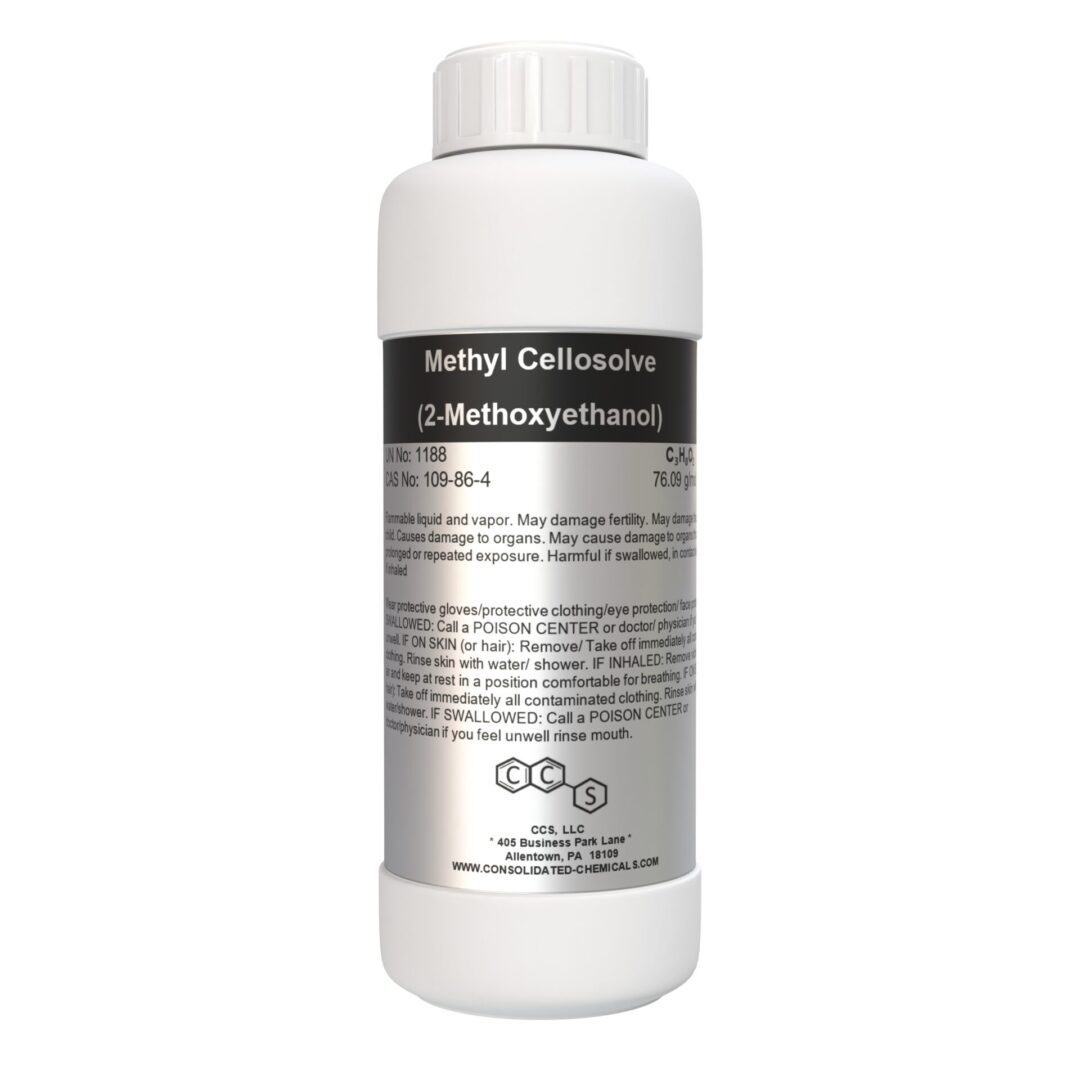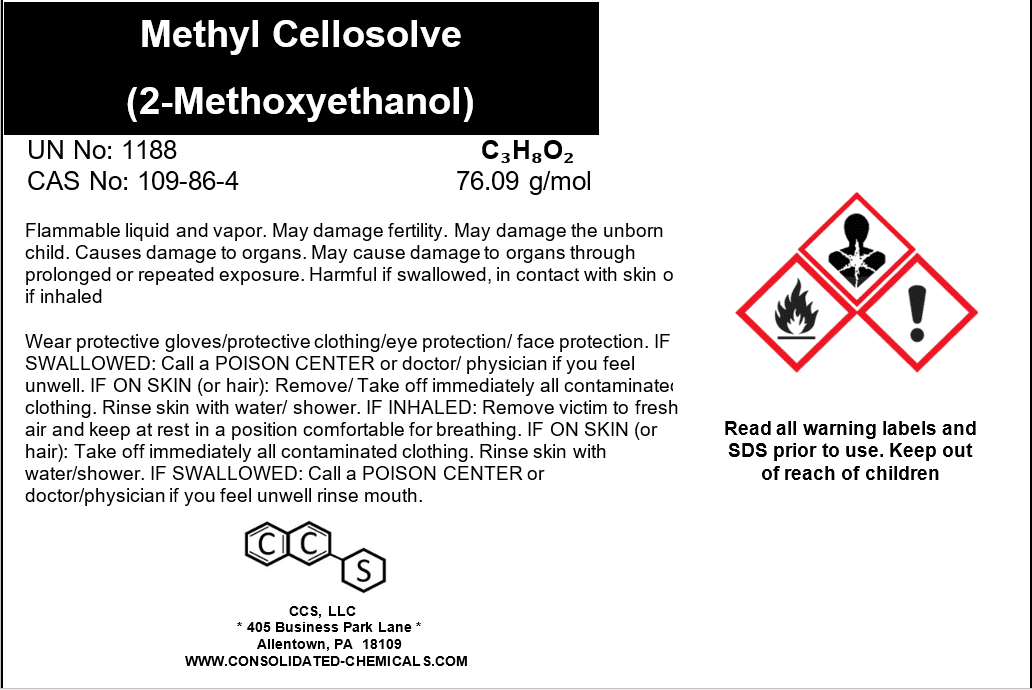Methyl Cellosolve (2-Methoxyethanol) | High-Purity Solvent
$14.99 – $34.00
Chemical Identity
- Chemical Name: 2-Methoxyethanol
- Common Name: Methyl Cellosolve
- Chemical Formula: C₃H₈O₂
- Molecular Weight: 76.09 g/mol
- CAS Number: 109-86-4
- EC Number: 203-713-7
Physical Properties
- Appearance: Clear, colorless liquid
- Odor: Mild, sweet odor
- Density: ~0.965 g/cm³ at 20°C
- Boiling Point: ~124°C (255°F)
- Melting Point: ~-85°C (-121°F)
- Flash Point: ~40°C (104°F) (closed cup)
- Autoignition Temperature: ~285°C (545°F)
- Vapor Pressure: ~10 mmHg at 20°C
- Refractive Index: ~1.402 at 20°C
- Solubility in Water: Completely miscible
- Viscosity: ~1.5 mPa·s at 20°C
Description
Methyl Cellosolve (2-Methoxyethanol) is a high-purity solvent renowned for its exceptional solvency and versatility. It is widely used in industrial and laboratory applications, including paints, coatings, resins, and cleaning solutions. As a chemical intermediate, it plays a vital role in the synthesis of dyes, resins, and specialty chemicals.
Applications for Methyl Cellosolve (2-Methoxyethanol):
Industrial Applications
- Paints and Coatings:Acts as a solvent for resins, pigments, and polymers, enhancing the performance and application of high-quality coatings.
- Adhesives and Sealants:Used to improve the adhesion, flexibility, and drying properties of adhesive and sealant formulations.
- Printing Inks:Provides excellent solvency and quick-drying properties in printing ink formulations.
Chemical Manufacturing
- Chemical Intermediate:Used in the production of specialty chemicals, including dyes, plasticizers, and synthetic resins.
- Polymer Synthesis:Plays a role in the synthesis of polymers and copolymers for industrial applications.
- Agrochemicals:Acts as an intermediate in the formulation of herbicides, pesticides, and fungicides.
Cleaning Applications
- Industrial Cleaning Solutions:A key ingredient in industrial degreasers and cleaning agents due to its ability to dissolve oils, greases, and other residues effectively.
- Electronics Cleaning:Used for cleaning electronic components and circuit boards because of its high solvency and low residue.
Laboratory and Research Applications
- Reagent and Solvent:Frequently used in organic synthesis and chemical reactions due to its excellent solvency and reactivity.
- Analytical Chemistry:Used in chromatography and spectroscopy techniques as a solvent for sample preparation and analysis.
Textile Industry
- Dye Solvent:Facilitates dyeing processes by acting as a solvent for dyes and improving their absorption and uniformity on textiles.
Storage Recommendations
- Storage Conditions:
- Store in a cool, dry, and well-ventilated area.
- Keep away from heat, open flames, sparks, and other ignition sources.
- Avoid exposure to direct sunlight to maintain stability and quality.
- Container Requirements:
- Use tightly sealed, chemical-resistant containers made of compatible materials, such as stainless steel or polyethylene.
- Ensure containers are properly labeled with the product name, CAS number, and hazard information.
- Segregation:
- Keep away from oxidizing agents, acids, and alkalis to avoid hazardous reactions.
- Do not store with food, beverages, or other incompatible materials.
- Temperature Control:
- Recommended storage temperature: 15°C to 25°C (59°F to 77°F).
- Protect from freezing, which may cause degradation or container damage.
Handling Recommendations
- Personal Protective Equipment (PPE):
- Gloves: Wear chemical-resistant gloves (e.g., nitrile or neoprene) to avoid skin contact.
- Eye Protection: Use safety goggles or a face shield to prevent splashes.
- Clothing: Wear chemical-resistant clothing or a lab coat to minimize skin exposure.
- Respiratory Protection: Use a respirator with organic vapor cartridges in poorly ventilated areas or when vapor exposure is possible.
- Work Area:
- Handle in a well-ventilated area or under a fume hood to reduce exposure to vapors.
- Use explosion-proof equipment and spark-proof tools when working with Methyl Cellosolve.
- Safe Handling Practices:
- Avoid inhalation of vapors, ingestion, or direct contact with skin and eyes.
- Wash hands thoroughly with soap and water after handling.
- Do not eat, drink, or smoke in areas where Methyl Cellosolve is handled.
Additional information
| Size | 250mL (8 Fl Oz), 500mL (16 Fl Oz), 1000mL (32 Fl Oz) |
|---|
Related products
-
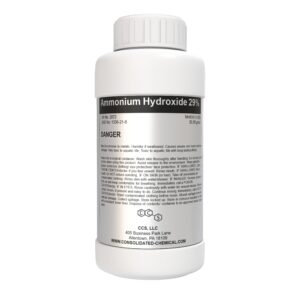
Ammonium Hydroxide 29% – Premium Aqueous Solution
$14.99 – $29.99 Select options This product has multiple variants. The options may be chosen on the product page -
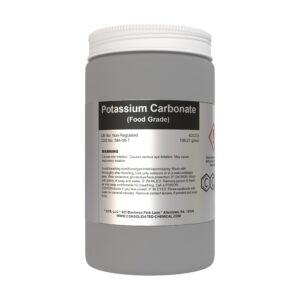
Potassium Carbonate – Food Grade (E501)
$24.99 – $39.99 Select options This product has multiple variants. The options may be chosen on the product page -
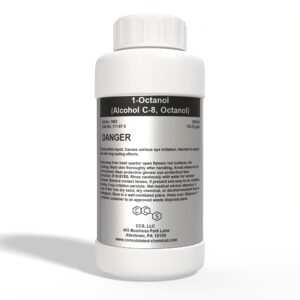
1-Octanol (Alcohol C-8) Premium Aroma Fragrance Compound
$12.00 – $95.00 Select options This product has multiple variants. The options may be chosen on the product page -
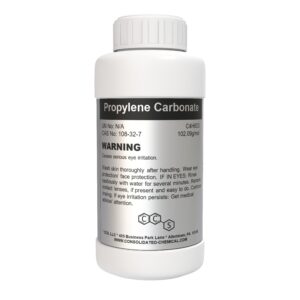
Propylene Carbonate (PC) – High Purity Solvent
$9.99 – $600.00 Select options This product has multiple variants. The options may be chosen on the product page
SKU: N/A
Categories: Industrial Chemical, Solvents (3)
Tags: 2-Methoxyethanol, 2-Methoxyethanol solvent, buy methyl cellosolve, CAS 109-86-4, Chemical Intermediate, Chemical-grade 2-Methoxyethanol, Cleaning solution solvent, High Purity Solvent, High-Performance Solvent, High-purity Methyl Cellosolve, Industrial Solvent, Industrial-grade Methyl Cellosolve, Laboratory Solvent, Methyl Cellosolve, methyl cellosolve alternative solvents, methyl cellosolve alternative uses, methyl cellosolve analytical chemistry, methyl cellosolve as an antifreeze agent, methyl cellosolve biodegradability, methyl cellosolve boiling point, methyl cellosolve bulk, methyl cellosolve CAS 109-86-4, methyl cellosolve chemical industry trends, methyl cellosolve chemical intermediate, methyl cellosolve chromatography solvent, methyl cellosolve cleaning agent, methyl cellosolve corrosion inhibitor, methyl cellosolve degreasing solvent, methyl cellosolve demand, methyl cellosolve density, methyl cellosolve distributor, methyl cellosolve drug synthesis, methyl cellosolve dye and pigment solvent, methyl cellosolve electronics industry, methyl cellosolve environmental impact, methyl cellosolve etching process, methyl cellosolve evaporation rate, methyl cellosolve export, methyl cellosolve flash point, Methyl Cellosolve for adhesives, Methyl Cellosolve for chemical synthesis, Methyl Cellosolve for cleaning agents, Methyl Cellosolve for coatings, Methyl Cellosolve for coatings and paints, methyl cellosolve for industrial applications, Methyl Cellosolve for industrial use, Methyl Cellosolve for polymers, Methyl Cellosolve for resins, methyl cellosolve for sale, Methyl Cellosolve for specialty chemicals, methyl cellosolve fuel additive, methyl cellosolve GHS classification, methyl cellosolve global market, methyl cellosolve green chemistry, methyl cellosolve handling, methyl cellosolve hazards, methyl cellosolve herbicide solvent, methyl cellosolve high purity, methyl cellosolve HPLC solvent, methyl cellosolve import, methyl cellosolve in adhesives, methyl cellosolve in agrochemicals, methyl cellosolve in coatings, methyl cellosolve in electrochemistry, methyl cellosolve in metalworking fluids, methyl cellosolve in paints, methyl cellosolve in pharmaceuticals, methyl cellosolve in photolithography, methyl cellosolve in polymer industry, methyl cellosolve in research and development, methyl cellosolve in textile industry, methyl cellosolve industrial grade, methyl cellosolve industrial solvent, methyl cellosolve ink formulation, methyl cellosolve laboratory solvent, methyl cellosolve logistics, methyl cellosolve lubricant additive, methyl cellosolve manufacturer, methyl cellosolve MSDS, methyl cellosolve near me, methyl cellosolve organic synthesis, methyl cellosolve OSHA regulations, methyl cellosolve pesticide formulation, methyl cellosolve pharma grade, methyl cellosolve plasticizer, methyl cellosolve price, methyl cellosolve production process, methyl cellosolve REACH compliant, methyl cellosolve refining, methyl cellosolve refractive index, methyl cellosolve regulations, methyl cellosolve renewable chemicals, methyl cellosolve safety data sheet, methyl cellosolve semiconductor cleaning, methyl cellosolve solubility, methyl cellosolve solvent properties, methyl cellosolve specialty chemicals, methyl cellosolve spectroscopic analysis, methyl cellosolve storage, methyl cellosolve supplier, methyl cellosolve supply chain, methyl cellosolve surfactant, methyl cellosolve toxicity, methyl cellosolve toxicology, methyl cellosolve viscosity, methyl cellosolve wetting agent, methyl cellosolve wholesale, Organic Solvent, Quick-drying solvent, Solvent for chemical synthesis, Solvent for cleaning agents, solvent for coatings, Solvent for dyes, Solvent for paints, Specialty chemical solvent


